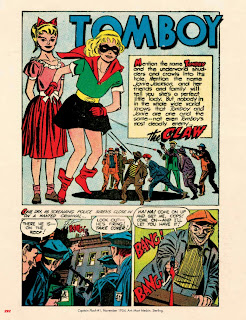I read a lot of graphic novels in the course of a year. Some I review here on this blog, and some I talk about on the
Comics Alternative podcast with my co-host Derek Royal. What follows is my list of what I felt were the best ones I read published in the last calendar year.
Best Overall
All the Answers by Michael Kupperman
This account of Kupperman's father's life is a fascinating look at celebrity, the early days of television, and how families keep and share secrets. It also is rather philosophical in how it treats the topic of writing autobiography as well. It's an excellent nonfiction debut by an artist mostly known for excellent humor comics.
Best Biography
Is This Guy For Real? by Box Brown
I love Box Brown's comics, and they frequently end up on this list. Here, he told the story of a person I knew a lot about, and I love how he wrote a book that captured his spirit, dug into some areas I was unfamiliar with, and surprised me with how moving it was. It's great for Kaufman fans both new and old.
Best Nonfiction
Brazen by Pénélope Bagieu
Pénélope Bagieu is one of the premier comics creators going right now. This collection of biographies of ground-breaking, strong, and impactful women is informative, entertaining, and inspiring. I will read anything she publishes, and this book is another masterpiece.
Best
Noir Story
Tyler Cross: Black Rock by Fabien Nury and artist Brüno
I love noir comics, and I waited to read this one for a few years now. This tale of a drifter who happens into a dangerous, small Texas town is gritty, violent, and thrilling. The artwork is colorful and really pops off the page. Also, it made me laugh out loud, a belly laugh even, with its dialogue.
Best Comedy/Western
Coyote Doggirl by Lisa Hanawalt
This book did two things exceptionally well. First, it told an excellent and suspenseful western adventure. Second, it did so with a lot of humor, attitude, and modern sensibilities that wink at and comment on common conventions associated with western tales. I love this book's artwork, and the main character's style and panache made me love and root for her even more.
Best Memoir
Hey, Kiddo by Jarrett Krosoczka
This YA memoir delves into some deeply personal and painful topics, and I love how it speaks to the redemptive power of art as well as how family is what you make of it. I was moved by much of it, and I hope this book becomes popular in middle school classrooms and libraries.
Best Short Story GN
I Am Young by M. Dean
This collection of short stories uses music as a background to look at people, how they define themselves, and how they try to build relationships with others. A few of these stories are excellent, and all of them are evocative and poignant. I loved reading them and also seeking out the artists and listening to the associated tunes.
Best Anthology
The Nib #1, edited by Matt Bors
Gathered from the content of one of my favorite
webcomic collectives, this magazine is the first in a series of quarterly publications. They feature great political comics, funny observational comics, and excellent, absorbing nonfiction comics. It has something for everyone who loves comics.
Best Science Fiction
On A Sunbeam by Tillie Walden
Originally published as a webcomic, this tome tells the tales of a group of space archaeologists who travel the galaxy fixing up collapsing sites and also of one if its members and her first love. It also features exquisite artwork, goldfish-shaped space-ships, and Gothic cathedral space-buildings. This book is more about how people live, love, and relate to one another than it is about "hard"sci-fi, but it's gorgeously rendered and you will fall in love with the characters.
Best Autobiographical Comic
In the Future, We Are Dead by Eva Müller
I found much to relate to in this book that ponders death and what happens afterward. Told in a series of nine autobiographical short stories, it is incredibly thoughtful, beautifully drawn, and also darkly funny. The exploration and evolution of how she thought of death from childhood to adulthood was both enthralling and moving. A much more hopeful book than it appears.
Any how, that is my list. Thank you for reading, and Happy New Year!




























